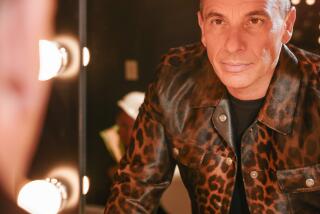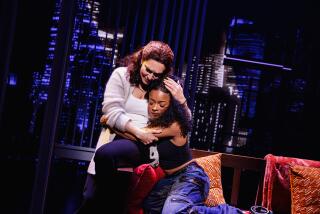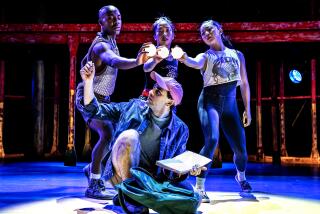STAGE REVIEW : Nothing Absurd About Salute to Ionesco at Doolittle
The man wanted to be there so badly he could taste it.
Saturday’s audience had come largely expecting him to be there, even though it had become known the day before that playwright Eugene Ionesco was ailing in Paris, with a severe flare-up of arthritis making him unable to undertake the long journey to Los Angeles.
But the “Evening With Eugene Ionesco,” a tribute to the 76-year-old playwright and a benefit for Hollywood’s Stages, proceeded undeterred. Everybody came--or so it seemed. The 1,000-seat James A. Doolittle Theatre hadn’t been so solidly packed in months. A telegram from the disappointed Ionesco was read expressing regrets at not being there. All the while, a large quizzical portrait of the playwright, hanging stage right, stared out balefully at the audience. Very Ionesco.
In a classy 90 minutes, the 10 outstanding actors who took the stage, donating their services and reading from the master’s work, gave a faithful sense of his lifelong torments and abiding themes. To quote from his memoirs: “The most absurd thing is to be conscious of the fact that human existence is unbearable, that the human condition is unbearable--intolerable--and nevertheless cling to it. . . .
“We are torn to pieces between the horror of living and the horror of dying. . . .”
In contrast to such pessimistic reflection (lucidly read by Joe Frank), the elegant Grace Zabriskie offered Ionesco’s playful side--in French. In crisp, beautiful accents, she delivered a witty monologue from “Exercices de Conversation” based on the uses of the word depuis (since).
Stages artistic director Paul Verdier (whose theater brought us a Ionesco festival in 1982) pointed out that Ionesco’s longest-running hit, “The Bald Soprano” (of which he was an early cast member), finished playing its 10,295th performance at the Theatre de la Huchette in Paris just as the Doolittle tribute got under way.
It was the perfect introduction for the first scene between “The Bald Soprano’s” Mr. and Mrs. Martin (read by Patty Duke and Bud Cort). This was followed by Fionnula Flanagan and Arye Gross in a sly, semi-staged exchange from “Jack or the Submission” and a hilarious one from Ionesco’s novel, “The Hermit,” in which the recluse (Cort) is visited by an unhappy husband (a superbly distraught Tom Waits) with whose wife he may be having an affair. The husband comes not to attack or lament so much as issue a charitable warning: The woman is terrible. No good can come of dealing with her--and he should know.
Between scenes, Frank continued with selections from Ionesco’s incisive memoir, “Present Passe Passe Present” which formed the program’s spine: “Whatever became of the person I was? The person I must still be? Where have I disappeared to . . . ? I have personal knowledge of the following fact: You can become someone else.”
But the evening’s crown was an excerpt from his most enduring three-act metaphor for the absurdity of human contradiction, “Exit the King.”
Rene Auberjonois was stunning as King Berenger who has been told that he’s about to die and can’t accept it, while Nan Martin and Salome Jens offered gleaming support as the young, idealistic queen and the older, more cynical, pragmatic one, respectively. It was a highlight made all the more eloquent for its transparency in relation to the unfilled seat waiting for the absent author’s presence.
If anyone ever doubted the durability of the Ionesco heritage, the crowd in the theater Saturday--more than half of which was made up of students who were there for no reason other than to hear the writer’s work--provided the loudest and clearest answer.
It was a lapidary event, chiseled by the participating artists and made all the more touching for the clarity with which they presented the man behind the words--a man railing at life’s absurdity, unwilling to die, getting older and now angrily ailing in Paris.
More to Read
The biggest entertainment stories
Get our big stories about Hollywood, film, television, music, arts, culture and more right in your inbox as soon as they publish.
You may occasionally receive promotional content from the Los Angeles Times.










